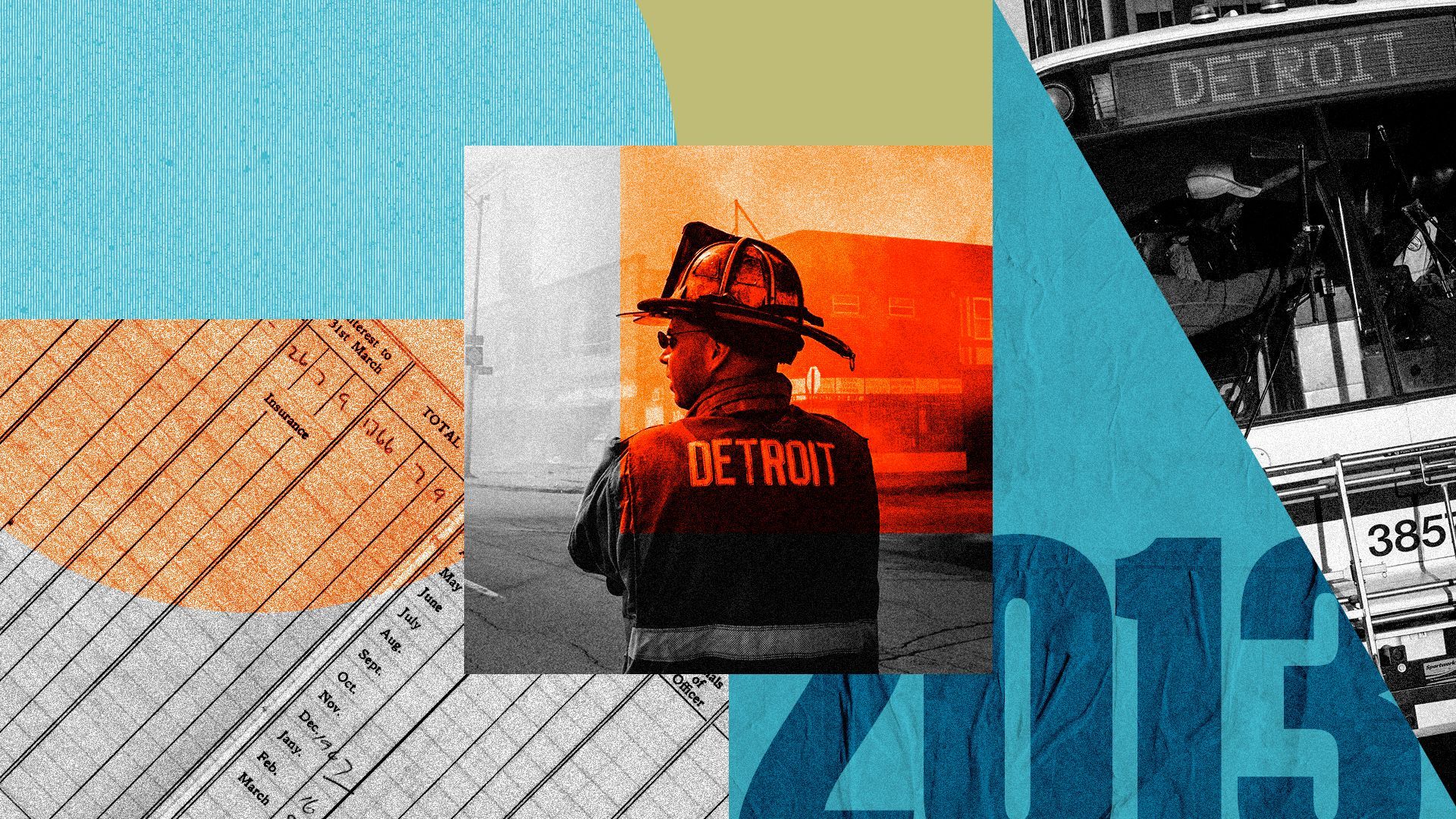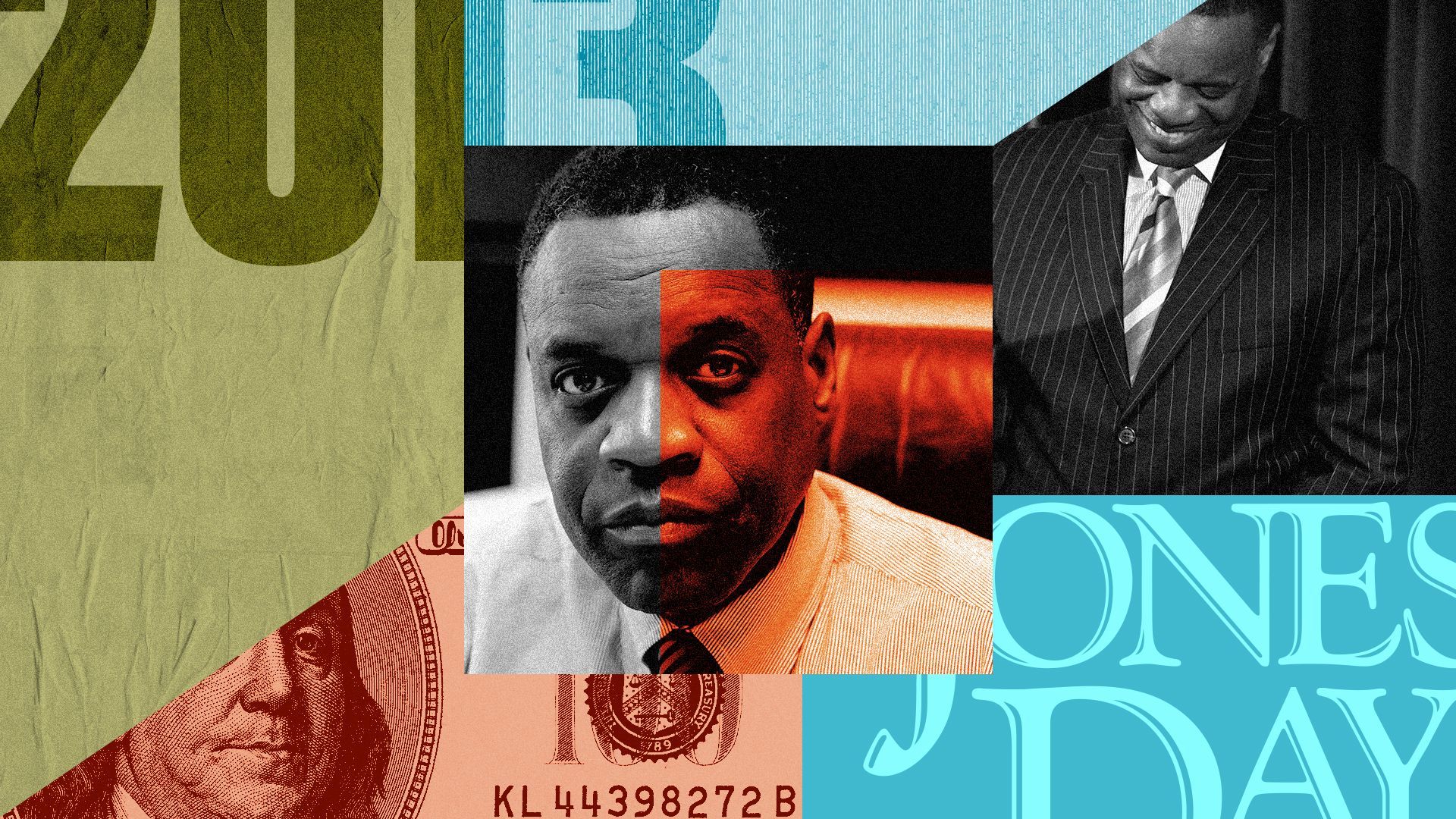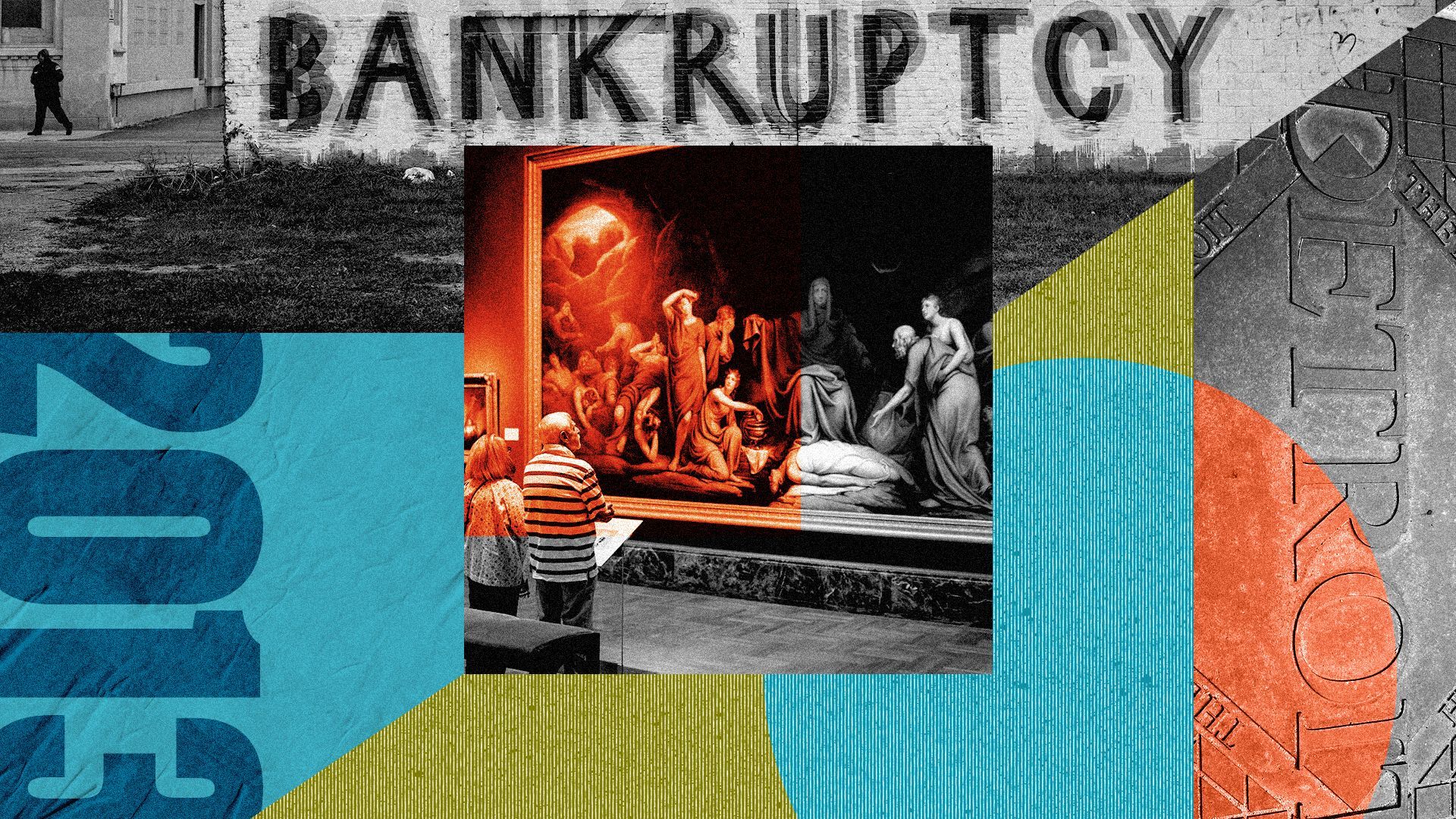July 18, 2023
Good morning. Today's newsletter is dedicated to the 10th anniversary of Detroit filing for bankruptcy.
🌤️ Today's weather: Mostly sunny and a high around 79°.
🚀 Become a member today and help fuel our mission of getting readers smarter, faster on the news that matters here.
Today's newsletter is 937 words — a 3.5-minute read. Edited by Everett Cook and copy edited by Cindy Orosco-Wright.
1 big thing: "It must never happen again"

Photo illustration: Lindsey Bailey/Axios. Photos: Andrew Burton/Getty Images
Detroit hit rock bottom 10 years ago today as the largest city to file bankruptcy in U.S. history.
Why it matters: The culmination of a yearslong financial crisis forced Detroit to confront decades of decline that left it fundamentally dysfunctional, awash in debt and unable to provide basic services.
- The decisions made 10 years ago laid the foundation for a comeback that includes major economic development projects, blight removal and neighborhood investment — but also had painful ramifications that are still being felt.
Flashback: With debts climbing over $18 billion, the city could no longer pay its bills.
- Abandoned buildings blanketed neighborhoods and maxed-out tax rates left officials with a lack of practical options.
- Elected officials lost power when then-Gov. Rick Snyder, a Republican, appointed Jones Day attorney and U of M grad Kevyn Orr to run the city as emergency manager.
The impact: U.S. Judge Steven Rhodes implored Detroiters to remember this anniversary when approving the city's exit strategy in 2014.
- "Your enduring and collective memory of what happened here, and your memory of your anger about it, will be exactly what will prevent this from ever happening again," he said in court. "It must never happen again."
Zoom out: A decade later, a review of some city services and trends shows:
Police: Data showing police response times before the bankruptcy is inconsistent, but estimates ranged from 20 minutes to nearly an hour.
- This year, the police department says it's 12 minutes, 35 seconds.
Blighted property: The city tracks progress tackling blight through the Detroit Land Bank Authority's inventory, which falls when abandoned houses are demolished or rehabbed.
- About 78,000 vacant and abandoned structures — about 20% of the city's housing stock — surrounded the city in 2013.
- The Land Bank's 40,000 vacant residential structures total in 2014 is now down to about 6,500.
Population: The decline entering bankruptcy was unprecedented, falling from a postwar height of 1.85 million people to about 685,000 at the end of 2012.
- About 620,000 currently live here, per recent Census data.
The bottom line: Significant improvements are clear, but many longtime residents continue to cope with poverty, crime and blight.
2. The outsider who ran Detroit

Photo illustration: Lindsey Bailey/Axios. Photos: Bloomberg/Getty Images
Former city emergency manager Kevyn Orr reshaped Detroit in dramatic fashion, making him one of the most transformative — and controversial — figures in local history.
State of play: A decade after he led Detroit through bankruptcy, Orr's legacy remains a topic of furious debate.
- His bankruptcy plan freed up hundreds of millions of dollars previously devoted to debt to be spent on services, but it also involved a 4.5% cut in pensions for civilian retirees.
- "Clearly there were people and forces that were not appreciative, but from my perspective, there were many more forces that were very appreciative," Orr tells Axios.
The other side: Mayor Mike Duggan told documentarian Sam Katz that "the city would have been better off if he'd never got appointed."
- Orr — who returned immediately after the bankruptcy to his post as an attorney for Jones Day in Washington, D.C — says: "The question I ask myself is, 'Did I make it better?' The answer is, invariably, yes."
The bottom line: Kevyn Orr left a permanent mark on the city's trajectory.
- "There's not gonna be a statue [of me] in Detroit," he says. "Who cares?"
3. Charted: Detroit's financial health on upswing


Detroit's bond rating is a way to measure whether it's on solid financial footing — like a person's credit score.
Flashback: When Detroit's rating crashed to an all-time low in 2013, it was skipping pension debt payments altogether.
State of play: Since then, rating agencies like S&P have grown more confident in Detroit's financial health as it has balanced budgets, saved money, grown revenue and weathered the pandemic.
Yes, but: S&P wrote this year about the city's remaining financial challenges, including resuming large pension debt payments after a 10-year reprieve, poverty, population decline and other economic uncertainties.
4. The Grapevine: Bankruptcy edition

Photo illustration: Lindsey Bailey/Axios. Photos: Bill Pugliano, Andrew Burton, Barry Lewis/Getty Images
🤔 How did Detroit fall into a financial crisis in the first place?
- This defining story shows how officials "repeatedly failed — or refused" over decades to make the calls necessary to avert catastrophe while residents left the city en masse. (Free Press, 2013)
🖼️ The "Grand Bargain" saved the Detroit Institute of Arts' collection from being sold to pay off debt during the bankruptcy.
- Private foundations and the state gave a combined $816 million, resulting in the DIA becoming independent from the city. (Detroit Historical Society, Detroit News, 2014)
📖 Want more on how the city wrestled its way out of the fiasco? Axios' Nathan Bomey, formerly a Free Press reporter, wrote a book — "Detroit Resurrected: To Bankruptcy and Back" — published in 2016.
A new career is waiting for you
💼 Check out who's hiring now.
- Corporate Treasurer at Aludyne.
- Senior Director of Corporate and Community Engagement at Samaritas.
- Senior Director, Government Relations at Community Choice Financial.
Want more opportunities? Check out our Job Board.
Hiring? Use code FIRST50 for $50 off your first job post.
5. Detroiters remember, 10 years later

Photo illustration: Lindsey Bailey/Axios. Photos: Bloomberg, Raymond Boyd/Getty Images
We recently asked Detroiters outside the Coleman A. Young building downtown one question: Is the city better 10 years later because of the bankruptcy?
- Responses were mixed, but most people surveyed said the city is now better off.
- Here are some of those responses:
Tammy P.: "Financially, the city obviously is in better shape, but what about its residents? That answer is going to be different for everyone."
Adam S.: "For some folks it's in a better place, but if you're a pensioner, it's pretty rough."
Claire M.: "Just look around. Downtown is fun and safe, I mean, this place didn't look like this in 2013."
Martin J.: "I'm a lifelong Detroiter — there's always been ebbs and flows. We ride with the tide, bend with the wind and live long enough for it to happen again."
📬 Tell us: Is our city better off now than in 2013? Hit reply.
Our picks:
💭 Joe is thinking about how much Detroit's media landscape has changed in the last 10 years.
🦦 Annalise is just sitting here thinking about otter yawns.
💖 Sam is gang gang. Mm, ice cream, so good!
👑 Everett is still on fire after seeing Alicia Keys last night.